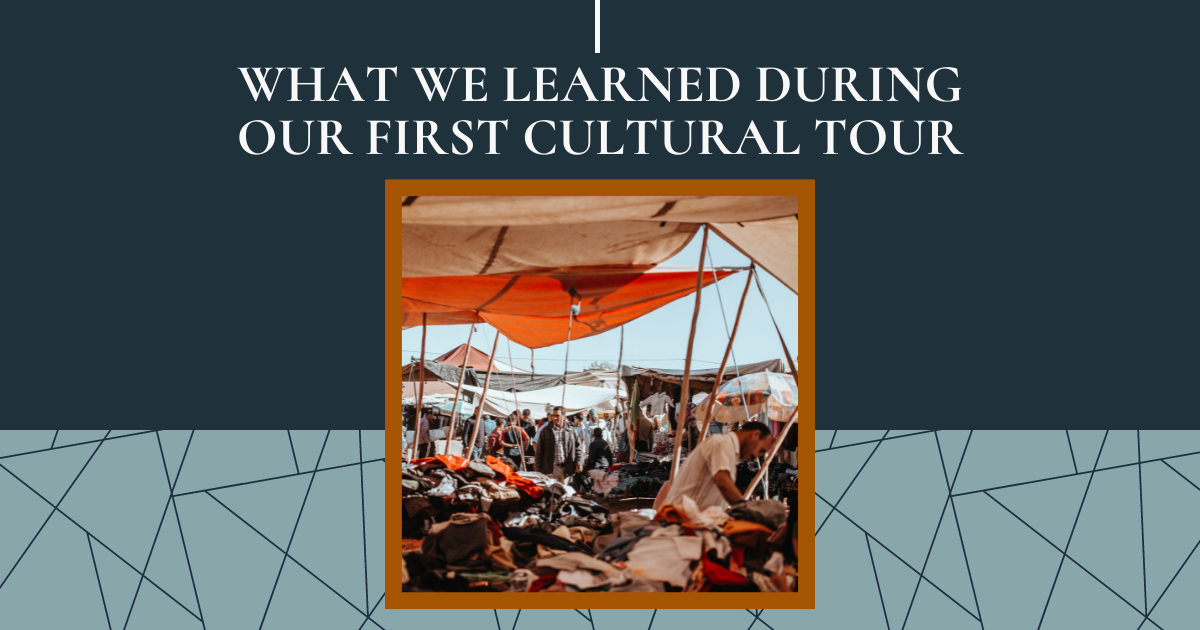Blog
Crossing Cultures and Building Connections
Learnings, teachings, tips & tricks for anyone who hopes to gain cultural understanding and experience the world with respect and dignity.
Moroccan People
Morocco is a very unique country for several reasons. The first is its strategic location in the northwest of the continent of Africa, just 14 kilometers south of Europe. This beautiful country is bordered by the Mediterranean Sea in the North, the Atlantic Ocean in the West, Algeria to the East, and Mauritania to the South. For this reason, Morocco is a crossroads where cultures, civilizations, and ethnicities meet.
Cultural Stories: The Kaftan of Love
Once upon a time there was a man who had three daughters and, wishing to depart on pilgrimage, asked each of them what he should bring back for her.
“Gold and silver bracelets crusted with gems,” said the eldest. “Gilded slippers,” said the second. But the youngest asked time to reflect before she answered. As soon as she found herself alone in her own chamber, a Rouhaniya (a fairy) appeared before her, saying: “Ask your father to bring you The Kaftan (traditional piece of Moroccan clothing worn by women) of Love Spotted with Passion.”
Moroccan Imperial Cities
Visitors to Morocco may take a tour that includes the four “Imperial Cities of Morocco,” a phrase that may be heard frequently but rarely explained. Fez, Marrakesh, Meknes, and Rabat have all been capital cities of Morocco at some point in history, which is why they are considered the Imperial Cities of Morocco. In this article, you will learn more about their history and why they might be worth a visit.
A Homestay Experience in the Old Medina of Fes
After almost a half year in Morocco learning Darija, I felt ready to take the plunge. Wanting to stay at a place for multiple months, I was advised to try out a couple of different homes. So I decided to dip my toes in for just a week at first.
Amazigh New Year
The Amazigh new year’s celebration is called “Yennayer,” the same name as the word for the first month in the Amazigh calendar. This word may be derived from the literal words in Amazigh for “first month” (Yan = One and Ayyur = month). The beginning of this year corresponds to the first day in January in the Julian Calendar.
Cultural Stories: The Language of the Birds
Once upon a time, there was a rich merchant in Fez who was in despair because he had no child. Also, his advanced age seemed to forbid him any hope in this respect. But his desire was so great that he asked one of his friends, who lived at a great distance, to come to visit him and to give him advice. This friend was a magician. When he had consulted his art, he said: “ You will have a son.”
Doing Business in Morocco
Humility and a learning spirit are two critical elements to operating a company as a foreigner in Morocco. The learning process for anything can be hard, and learning to operate a business is no exception. Operating a business will vary from city to city, with rules and regulations required in one city but not in another. Below are some ideas to make your business experience a little easier.
Cultural Stories: The Carpenter’s Daughter
Once upon a time, there was a poor carpenter whose wife died in childbirth, leaving a daughter on his hands; in truth, a beautiful baby, but one whose upkeep was a grave burden upon her father, and who therefore seemed to have been born under very sad auspices. How could the unfortunate man take care of his child when he had no money, no relations, no slave, and was worn out by his work?
Banking in Morocco
If you are planning to live in Morocco, then chances are you will need to open a bank account or two. The good news is that foreigners can open an account in Morocco. In fact, for foreigners seeking residency in Morocco, providing proof of funds in Morocco is a requirement.
Should You Learn Moroccan Arabic or Modern Standard Arabic?
The local dialect of Arabic in Morocco is called Darija (الدارجة), which means “everyday, colloquial language.” Modern Standard Arabic (MSA/Fossha), which is the international Arabic language, is used in writing and in official communication, but often feels somewhat artificial, or stuffy, because people don’t actually speak MSA.
Five Reasons Fez is the Best Place to Study Darija
The people of Fes are known for their clear pronunciation and purity of language. When traveling or studying in other parts of Morocco, you will encounter regional words, phrases, and pronunciations specific to that region. Amidst the regionalisms of the country, Fes stands out as the place where regionalisms are fewer, and your language abilities acquired in the city will be understood wherever you travel in the country.
Cultural Stories: The Fatal House
Reading and reflecting on the fairy tales, myths, folktales, proverbs, and sayings from another culture help us gain insight into that culture in ways we otherwise may not glean. Let’s look together at on such tale, called The Fatal House, taken from Tales of Fes.
Driving in Morocco
“What have we gotten ourselves into?” I asked myself as our car scraped the rocks beneath us. We were traversing a dried river bed in search of our lodging for the night, and my mind was racing to the reaction of the rental car company when we returned the car in a few days. “How much is it going to cost if we total the vehicle?” I continued wondering.
Most Asked Questions about Learning Moroccan Arabic
Darija is the local dialect of Arabic in Morocco. Darija means “everyday, colloquial language” and therefore has connotations of informality, mostly used in casual conversations. Moroccan Darija shares an estimated 70-75% of its vocabulary with Modern Standard Arabic (MSA).
Renting an Apartment in Morocco
Curious about renting a place in Morocco. Here is some helpful information as you go about this process.
Listings - Many locals will likely say to go to the neighborhood you like and ask people who live there if they know of any vacant places for rent. This probably makes for a great cultural experience. You can also ask a friend to help you, and he or she will dip into their vast relational network to find a number of available places.
Volubilis: Roman Ruins in Morocco
Taking the suggestion of our friend to visit the “super cool” ruins, my wife and I decided to visit. On a recent trip from Azrou to Casablanca, Cailyn and I drove to Volubilis to check out the ancient Roman ruins of Volubilis. The centuries-old site is located about 30 minutes north of the city of Meknes. Volubilis is a UNESCO World Heritage Site and it is definitely worth a visit.
Tourist vs. Guest
When visiting a foreign country, many people come as tourists, excited to visit the world-renowned places, eat the local food, and move around as easily and efficiently as possible. However, it takes additional effort to visit a place as a guest, striving to know local people, understanding the culture and norms, and experiencing authentic life.
Cultural Stories: Lalla Khallal El Khadra
William Gudykunst said, “One of the major factors influencing our effectiveness in communicating with people from other cultures is our ability to understand their culture.” Communication is about more than just the words we say; it is about both language and culture, what we communicate through words and actions. Here at Crossroads Cultural Exchange, we believe that we can't separate learning language from learning culture. As one of out teachers says, "Culture is the spirit of a language."
About Amazigh (Berber Languages)
The indigenous people of Morocco have spoken a local dialect of Berber/Amazigh for about the last 2000 years. Recent efforts to create one, standardized, literary form has led to the creation of the Amazigh language, which was constitutionally recognized as an official language in 2011. In Morocco, there are three main dialects of Amazigh: Tashelhit, Tamazight, and Tarifit.
What We Learned During Our First Cultural Tour
Right after Êid al-Fitr in early May, we received our first group for a cultural tour of Morocco. Twelve people participated in The Navigator Program, which we designed in order to give people the opportunity to not only learn about culture in general, but also to gain experience with the cultural concepts we discussed. We call this program an “immersive educational experience” because it’s more than a tour; the group explores Morocco while also learning how to navigate cultures.
Start your journey
Do you have questions about culture and understanding the world around you? Join us for an online cultural consulting session, or find out about one of our programs in Morocco.





























